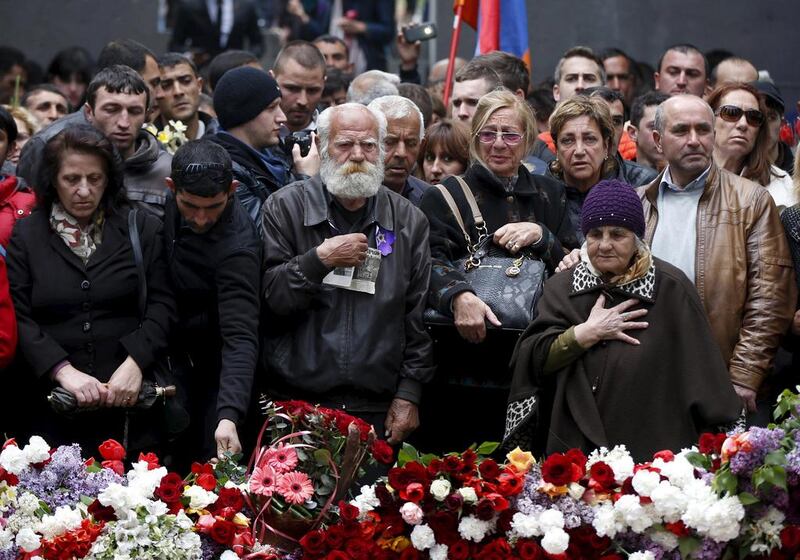I expected to be attacked for my column on the Armenian genocide. Criticism can be good and can provide a springboard to discussion. Unfortunately, some of the letters I received were anything but constructive. They were defensive, crude and insulting.
In a way, the reaction reminded me of the responses I received six years ago when I wrote a column supporting Barack Obama’s decision to hold back from using the term genocide so as not to disrupt the Turkish- Armenian negotiations. After that column appeared, some Armenian-American groups felt that I had done their community a grave injustice.
I was troubled then and I am troubled now. And it’s not because of the criticism. It has more to do with the rawness of the reaction. It feels as though Armenians need the acknowledgement of genocide in order validate their history, while Turks need to deny genocide to validate theirs. All in all, this is not a healthy state of affairs. As a result, both Turks and Armenians are engaged in a zero-sum game. If you use the “g word”, you are damned by the Turks. If you don’t use it, you are damned by the Armenians.
Having said that, I want to be clear that I side with the Armenians. They continue to be victimised by Turkish efforts to obfuscate history.
It may be that in response to Turkish obstinacy, Armenians have felt forced to also play zero sum with the matter of genocide. I wish they had not taken that path. As I said in 2009, and still say today, they should give Mr Obama a break. For example, in his message to the Armenian people, issued on the eve of this year’s anniversary, the US president used evocative language to describe the horrible tragedy, saying: “Beginning in 1915, the Armenian people of the Ottoman Empire were deported, massacred and marched to their deaths. Their culture and heritage in their ancient homeland were erased. Amid horrific violence that saw suffering on all sides, 1.5m Armenians perished.” The president also spoke about “a dark chapter of history”.
In the end, US recognition of genocide will not bring justice to the Armenian nation. That will only come when Turkey is able to accept its own past.
There appeared to be signs of positive movement in that direction last year when Recep Tayyip Erdogan, the then prime minister, called the killings “inhumane”. His successor, Ahmet Davutoglu, expanded on these same themes last week.
These signs of openness close quickly, however, when foreign leaders dare to use the “g word”. Turkish officials were, for example, extraordinarily harsh in their denunciation of Pope Francis for commemorating the anniversary of the genocide. As disturbing as I found the language that was employed, what bothered me more was the extent to which the denunciations were coupled with historical falsification.
I got a taste of this last week when a Turkish organisation sent me a 10-page letter that alternated between silly insults and attempts to educate me.
The insults were no more than trite name-calling. The “education” was more disturbing. The letter’s argument drifted between an invitation to put all the facts on the table and telling me what they believe really did happen.
The group’s letter also sought to educate me on how many Armenians actually perished. They questioned the oft-cited figure of 1.5 million, by claiming that there were no more than that number of Armenians to begin with.
Then, by demonstrating that at war’s end almost one million Armenians remained alive, the letter noted: “We will leave it up to you to perform the easy calculation to figure how many died?”
I cite this letter because it is symptomatic of the problem of the lengths to which some will go. They continue to rebuff efforts to prod them to acknowledge their past – as the White House continues to do.
As Mr Obama noted, many nations were born with “original sins”, including the US itself. The genocide against Native Americans and the institution of slavery remain festering wounds that have not healed. Europe’s legacy of colonial conquest, Germany’s horrific crimes against Jews and others, Israel’s forced expulsion and dispossession of Palestinians are all “original sins” that these nations must acknowledge and for which they must make restitution if they are to have peace.
A nation’s refusal to come to grips with its past is more a sign of weakness than of strength. Making peace with your past makes you stronger and more able to deal with future challenges. The inability to do so is disturbing. Denial and bullying the victim only delays the recognition that must ultimately come.
James Zogby is the president of the Arab American Institute
On Twitter: @aaiusa





